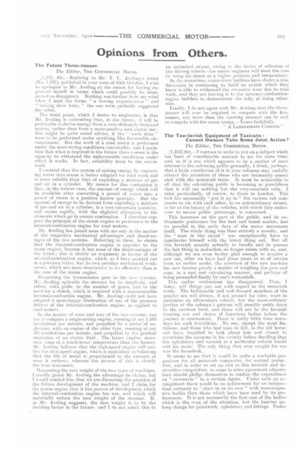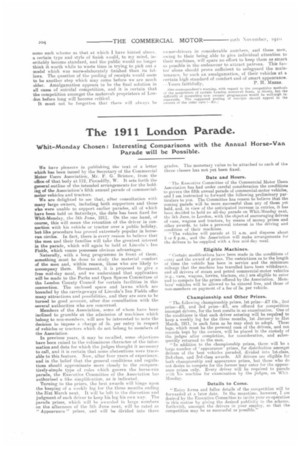Opinions from Others.
Page 15

Page 16

If you've noticed an error in this article please click here to report it so we can fix it.
The Future Three-tanner.
The Editor, THE COMVERCIAL MOTOR.
L1,251] Sir,-Replying to Mr. T. C. Aveling's letter (No. 1,237), published in your issue of 20th October, I wish to apologize to Mr. Aveling at the outset for having ex
pressed myself in terms which could possibly be interas derogatory. Nothing was further from my mind when 1 used the terms " a bowing actominta nee " and
" raising their hats ; " the one term probably suggested the ether.
The main point, which 1 desire to emphasive, is that Me. Aveling is contending that, in the future, it will be preferable to derive energy from a very-delicately-balaneed system, rather than from a more-positive and elastic one ; this might be quite sound advice, if the " eork done " were to he performed under anything like favourable eireumstances. But the work of a road motor is performed under the most-trying conditions conceivable. aud I maintain that what is required in the future three-timer is the capacity to withstand th.e unfavourable conditions under which it works. In fact, reliability must be the watchword.
I contend that the system of raising energy by converting water into stellITI is better adapted for road work and is more reliable than that of exploding a mixture of gas and air in a cylinder. My reason for this eontention is that, in the former case, the amount of energy which will be available after converting a pound of water into a pound of steam is a positive known quantity. But the amount of energy to be derived from exploding a mixture of gas and air in a cylinder, is a very-micertain quantity, and varies rapidly, with the slightest alteration to the elements which go to ensure combustion. I therefore support the principle of the steam engine in preference to the internal-combustion engine for road motors.
Mr. Aveling has joined issue with me only in the matter of the respective mechanical advantages and disadvantages of the two systems. Referring to these, he claims that the internal-combustion engine is superior to the steam engine, because it has none of the disadvantages of the latter ; this is clearly no argnment in favour of the internal-combustion engine, which, as I. have pointed out in a previous letter, has its own peculiar mechanical weaknesses, which are more destructive to its effieiency than is the ease of the steam engine.
Respecting the transmission gear in the two systems, Mr. Avelino. upbraids the steamer for its simplicity, and refers, with pride, to the number of gears, end to the need for a clutch, which is required with a nun-reversible internal-combustion engine. Mr. Aveling teeth] not have adopted a more-happy illustration of one of the greatest ,lefects of the internal-combustion engine, as applied to road motors.
ILL the matter of wear and tear of the two systems, one Pills to compare a single-acting engine, running at say 1,000 revolutions per minute, and propelled by a series of explosions, with an engine, of the older type, running at say MO revolutions per minute, and propelled by the gradual c,xpansion of an elastie fluid. The latter engine, moreover, runs at a. much-lower temperature than the former. Aveling believes that the high-speed engine will outlive the slow-speed engine, which is equivalent to believing that the life of metal is proportional to the amount of wear it endures, whereas the inverse of this is clearly the true statement.
Respecting the tare weight of the two types of machines, I readily grant Mr. _Aveling the advantage he claims, but I would' remind him that. we are discussing the question of the future development of the machine, and I claim for the steam engine that it has powers of development which the internal-combustion engine has not, and which will materially reduce the tare weight of the steamer. If, as Mr. Aveling suggests, the tare weight is to be the deriding factor in the future—and I de not admit this to
an unlimited extent, owing to the factor of adhesion of the driving wheels--the steam engineer will meet the case by using his steam at a higher pressure and temperature. In die meantime, steam-lorry builders have shown a wise discretion in continuing to build an article which they know is able to withstand the excessive wear due to road work, and they are leaving it to the internal-combustionengine builders to demonstrate the folly of doing otherwise.
rinally, T do not agree with Mr. Aveling that the threetonner will ever be required TO compete with the fivetanner, any more than the coasting steamer can be said to compete with the ocean tramp.--Yours faithfully,
" A LANACASHIHE CARRIER."
The Too-lavish Equipment of Taxicabs : Cannot Owners Take Some Joint Action?
The Editor, THE COMMERCIAL MOTOR.
[1,2521 Sir,—T. venture to write to you on a subject which has been of considerable interest to me for some time, and, as it is gee winch appears to be a matter of some interest to the cab-using public generally, 1 think, perhaps, that a little ventilation of it in your columns may usefully attract the attention of those who are intimately associ
ated with the motorcab trade. It must be noticeable to all that the cab-riding public is becoming so .punctilious that it will use nothing but the very-smartest cabs.
refer, particularly, of course, to those in London. This fact has necessarily " put it up to " the various cab com panies to vie with each other, to an extraordinary extent, so far as the luxury of the vehicles, with which they endeavour to secure public patronage, is concerned.
This keenness on the part of the public, and its enthusiastic preference for the. best and latest models, had its parallel in the early days of the motor movement
itself. The whole thing was then entirely a novelty, and the " man in the street " was exceptionally keen to
familiarize himself with the latest thing out. Tiut all this feverish anxiety actually to handle and to poesess the last thin' g in motordom no longer exists with us, and, although we are even to-day glad enough to acquire a new car, after we have had_ three years or se of service from an earlier model, the selection of the new nmehine has now become purely a matter of weighing the pros and cons. in a cool anti calculating manner, and perhaps of being persuaded finally by one's womenfolk.
This earlier enthusiasm has disappeared. Thus, I fancy, will things pan out with regard to the motorcab trade. The fashionable and well-dressed members of the gentler sex will always, if not pressed for time, want to patronize an ultra-smart vehicle, but the more-ordinary portion of the eabman's patrons will steadily settle down to the common level, and there will not be the feverish hunting out and choice of luxurious bodies before the journey: is commenced. There is really little time nowadays for such trivialities. No one, except the most fa,stidious, and those who had time to kill, in the old horsecab days, troubled to look about him and closely to scrutinize the hansoms in Ids vicinity before deciding that the upholstery and varnish in a particular vehicle would suit his taste. The only thing that ever caught Ids eye e as the horseflesh.
It seems to me that it would be quite a workable proposition for all motoreali companies, for mutual protection, and in order to set an end to this feverish and destructive competition, to come to some agreement whereby they should pledge themselves to confine the expenditure OR " ca.rosserie " to a certain figure. Under such an arrangement there would be no inducement for an independent company to "start in on its own " with more-expensive bodies than those which have been used by its predecessors. It is not necessarily the first cost of the bodies which is the crux of the situation, but the heavier upkeep charge for paintwork, upholstery and fittings. Under
some such scheme as that at which I have hinted above. a certain type and style of finish would, to my mind, inevitably become standard, and the public would no longer think it worth while to waste time in trying to pick out a model which was more-elaborately finished than its fellows. The question of the pooling of receipts would seem to be another step which may come before we are much older. Amalgamation appears to be the final solution in all cases of suicidal competition, and it is certain that the competition amongst the motorcab proprietors of London before long will become critical.
It must not he forgotten that there will alwa■s be int ner-drivers in considerable numbers, and these men, owing to their being able to give individual attention to their machines, will spare no effort to keep them as smart as possible in the endeavour to attract patrons. This factor alone should prove sufficient to safeguard the maintenance, by such an amalgamation, of their vehicles at a certain high standard of comfort and of smart appearance. --Yours faithfully, P. 11. Means.
!Our correspondent's wanting, with regard to the competitive methods of the proprietors of certain London motorcab fleets, is timely, but the difficulty of restricting new owners' programmes would be well.nigh insuperable. The suggested pooling of receipts should appeal to the owners of the older cabs !—L'mi




















